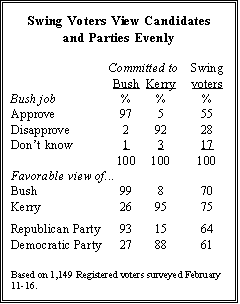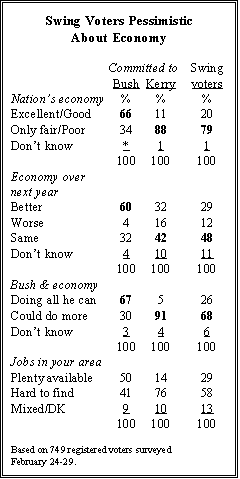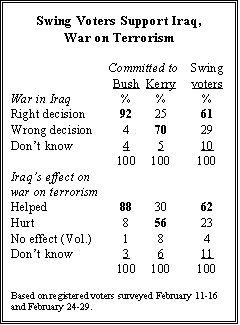Summary of Findings
 Heading into an eight-month marathon to Election Day, President Bush and Sen. John Kerry already command strong support from their respective parties and will now try to win over those in the middle: the estimated three-in-ten voters who have not yet fully committed to either candidate. Overall, 38% of voters support Kerry and say they have definitely decided not to vote for Bush. A third of voters support Bush and say there is no chance they will vote for Kerry.
Heading into an eight-month marathon to Election Day, President Bush and Sen. John Kerry already command strong support from their respective parties and will now try to win over those in the middle: the estimated three-in-ten voters who have not yet fully committed to either candidate. Overall, 38% of voters support Kerry and say they have definitely decided not to vote for Bush. A third of voters support Bush and say there is no chance they will vote for Kerry.
The remaining portion of the electorate (29% of all voters) have either expressed a preference for one of the candidates yet say they still could change their mind, or are truly undecided. Most of these swing voters have expressed a preference 13% favor Bush, 10% Kerry though they are still open to the possibility of changing their mind. Just 6% of voters are firmly on the fence at this early stage of the campaign.

The latest Pew Research Center national survey, conducted Feb. 24-29, shows Kerry with a slight edge in a head-to-head match up with Bush (48%-44%). The results of this survey were combined with poll conducted earlier in February (Feb. 11-16) as a way of determining the size and composition of the swing vote.
As might be expected, a relatively large percentage of swing voters are independents (39%), but a majority identify with one of the two parties (27% Republican/25% Democrat). Nearly half (48%) describe themselves as moderates, but roughly a third identify themselves as conservatives (34%). A majority of swing voters are women (55%). (see profile pg. 4)
Swing Voters on the Candidates, Issues
 A majority of swing voters (55%) approve of President Bush’s job performance and most take a favorable view personally of both candidates (75% favorable for Kerry, 70% for Bush). They also have a generally positive opinion of both political parties (64% Republican/61% Democrat).
A majority of swing voters (55%) approve of President Bush’s job performance and most take a favorable view personally of both candidates (75% favorable for Kerry, 70% for Bush). They also have a generally positive opinion of both political parties (64% Republican/61% Democrat).
When it comes to the issues, swing voters tend to side with Kerry’s supporters in their economic perceptions and attitudes, but they agree with Bush’s supporters on Iraq and the war on terrorism.
Just 20% of swing voters rate the nation’s economy as excellent or good, while 79% rate it as only fair or poor. They share this view with Kerry supporters, 88% of whom rate the economy in relatively negative terms. Most Bush supporters (66%) say the economy is doing well.
Bush supporters are twice as likely as either Kerry supporters or swing voters to believe the economy will improve over the next year (60% vs. 32% and 29%). Pluralities of Kerry supporters and swing voters expect the economy to remain the same over the next year.
And fully two-thirds of swing voters (68%) say President Bush could be doing more to improve economic conditions, while 26% say he is doing all he can. While not as critical of the president as Kerry backers (91% of whom say the president could be doing more), most Bush backers take the opposite view.
 On policies on Iraq and the war on terror, however, swing voters tend to agree with the president’s decisions. By two-to-one (61% to 29%) swing voters say taking military action in Iraq was the right decision. Not surprisingly, Bush backers almost unanimously (92%) support the war, while Kerry backers oppose the war by a 70% to 25% margin. And similarly, most swing voters, along with Bush backers, say the war in Iraq helped in the broader war on terrorism. Kerry supporters tend to take the opposite view.
On policies on Iraq and the war on terror, however, swing voters tend to agree with the president’s decisions. By two-to-one (61% to 29%) swing voters say taking military action in Iraq was the right decision. Not surprisingly, Bush backers almost unanimously (92%) support the war, while Kerry backers oppose the war by a 70% to 25% margin. And similarly, most swing voters, along with Bush backers, say the war in Iraq helped in the broader war on terrorism. Kerry supporters tend to take the opposite view.
Divided Over Social Issues
On two of three social and cultural issues that have played important roles in past presidential elections - abortion and gun control – swing voters fall somewhat closer to Kerry supporters than to Bush supporters. But on the social issue that looms large in this fall’s contest - gay marriage – swing voters fall in between.

A majority of those who are committed to supporting Bush (56%) say they favor changing the laws to make it harder for a woman to obtain an abortion. By contrast, just 23% of committed Kerry supporters feel this way. Swing voters side with Kerry voters on this issue just 33% favor toughening restrictions on abortion.
Similarly, a majority of Bush supporters (56%) say it is more important to protect the rights of gun owners than to control gun ownership. Only 26% of Kerry voters agree, and swing voters (at 37% agreement) fall closer to Kerry supporters than to Bush supporters.
On the issue of gay marriage, however, half or more of all three groups of voters say they oppose allowing gays and lesbians to marry legally. Bush voters are nearly united in opposition to gay marriage, with 82% opposed. Half of Kerry voters oppose gay marriage. Swing voters fall between these two groups, with 64% opposed 18 percentage points less than Bush voters, 14 percentage points more than Kerry voters.
 |
 |


